5 books that will help advance your career
Time management is so 2010. The new game in town? Attention management.

A free daily email with the biggest news stories of the day – and the best features from TheWeek.com
You are now subscribed
Your newsletter sign-up was successful

No matter which rung you occupy on the corporate ladder, there's always farther to climb — more skills to sharpen, bosses to impress, raises to earn.
In the never-ending quest for professional improvement, you may find accelerated success by enrolling in workshops, picking the brain of your favorite mentor — or simply devouring an insightful, strategy-packed career book.
But how do you know which tomes are truly helpful and worth your time?
The Week
Escape your echo chamber. Get the facts behind the news, plus analysis from multiple perspectives.

Sign up for The Week's Free Newsletters
From our morning news briefing to a weekly Good News Newsletter, get the best of The Week delivered directly to your inbox.
From our morning news briefing to a weekly Good News Newsletter, get the best of The Week delivered directly to your inbox.
Enter: LearnVest. We read five career page-turners for you, chatted with the authors, and mined the best tips you can apply to your own career strategy — starting today.
1. The book: The Up Side of Down: Why Failing Well Is the Key to Success
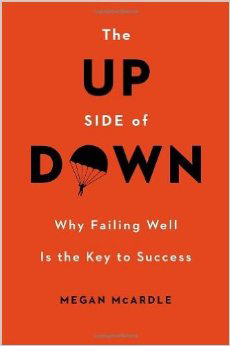
According to Bloomberg View columnist Megan McArdle, failure has significant power to lead us to success — if you know how to harness it. Citing business, economic, and psychological research, she argues that the professional skill we should all be cultivating is the art of bouncing back.
McArdle's big tip: Relinquish your fear of failure.
A free daily email with the biggest news stories of the day – and the best features from TheWeek.com
What that means: When we expect that professional failures can — and will — occur, we give ourselves permission to take a leap or two. And if a soul-crushing failure strikes as a result, you can skip the shock-paralysis mode — because you were already expecting a few bumps in the road — and quickly change your course.
So diagnose and assess failures early, then accept them — and move on. "Realize you are not a failure — you are a person who has failed," McArdle says. "Failure is how we learn and can set us up for the next achievement."
Her advice in action: Even some of the most recognizable, successful people floundered before they ultimately got it right. And while you may not ever experience large-scale failure, the takeaway is the same. So next time you hit a professional snag — you miss a deadline, bomb the presentation, or are late to an important shareholder meeting — allow yourself to feel bad for just a minute … then spring into action: Take responsibility for your mistake, come up with a recovery plan — and then use the experience as fuel for your future successes.
2. The book: How to be a Productivity Ninja: Worry Less, Achieve More and Love What You Do
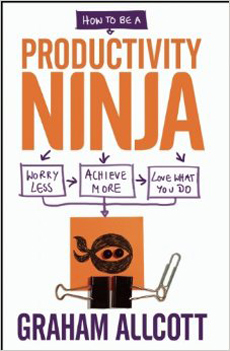
Go-getters, listen up: Time management is so 2010. The new game in town? Attention management.
That's according to Graham Allcott, founder of Think Productive, a training firm in the U.K. that has advised staffers at companies ranging from eBay and Heineken to GlaxoSmithKline on how to fine-tune productivity at every corporate level.
Here's the gist: With so many trifling tasks grasping for our attention during the typical workday, it's easy to lose sight of the macro view of your career. Allcott's principles aim to help professionals refocus on the bigger picture in order to master key projects that'll lead them to greater achievement.
Allcott's big tip: Go off the grid.
What that means: One of his signature strategies outlined in the book is called "stealth and camouflage." Basically, Allcott says, the best way to be more productive at work is to dip under the radar.
"Be willing to disconnect from phone, email, text, social media, even your office environment, when there's a bigger goal in sight that you want to achieve," Allcott says.
His advice in action: We know what you're thinking: much easier said than done.
But Allcott isn't suggesting you complete your important work projects in a remote cabin in the woods with no cell-phone service or access to Facebook. Instead, make a conscious effort to protect your attention span by actively fighting typical office distractions.
For example, send phone calls to voice mail when they're likely to be less important than the task you're working on, set strict boundaries for signing off email, social media, or instant messenger programs when you're under the gun, and book time on your own calendar for creative thinking, forward planning, and review. (Allcott also suggests making your calendar settings private, as more persistent coworkers may try to schedule over meetings called "personal thinking time.")
If you have a little flexibility, spend time working away from your desk when you can — at home, in cafés, in a meeting room, or outside. You'll be less tempted to devote time to putting out little fires that occur throughout the day — and more productive on the projects most likely to get you noticed.
3. The book: Body of Work: Finding the Thread That Ties Your Story Together
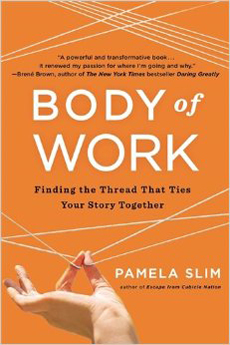
Veteran business coach Pamela Slim says there's no such thing as a textbook career trajectory anymore. Increasingly, many of us are following more unconventional routes — an amalgam of corporate posts, start-up work, freelance projects, and even side gigs.
"Work is inherently unstable nowadays, and it's not going back to the way it was," Slim says. "We need a new way to think about careers."
Slim's solution? Craft a narrative that weaves together your diverse skill set and varied successes — an explanation of who you are and what you can do.
Slim's big tip: Think back on your career accomplishments and identify what common threads tie them together.
What that means: This, Slim says, is your body of work — and your ability to craft a powerful one is what will ultimately determine your ongoing employability.
"[You'll find work now] because you have clarity on where you've been and where you're going. The story component is key. You need to drive the story, set context and constantly reposition yourself," she says.
Her advice in action: Are you looking to take a career leap, but aren't sure what next step complements your body of work? Slim says to start by "naming your ingredients" — and make sure they're integrated into your work.
That's exactly what David Batstone, a sustainable business professor, journalist, and business investor in San Francisco, did. After reading a news story where he learned the owner of his favorite Indian restaurant was involved in a human-trafficking ring, Batstone, a longtime human-rights activist, was inspired to combine his varied career paths into a single focal point.
Using his "ingredients" — his roles as a journalist, investor, professor, activist, father, and husband, plus his other related skills and values — Batstone co-founded Not for Sale, a nonprofit that fights human slavery.
"For Batstone, it was having multiple, disparate dots to bring together that allowed him to discover and clobber his next big project — the cumulative one that would make the most impactful, positive changes to date in his professional life," Slim says.
4. The book: Springboard: Launching Your Personal Search for Success
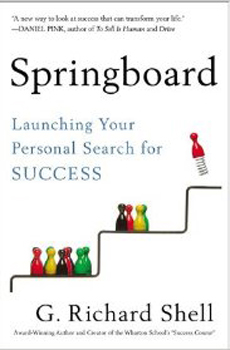
G. Richard Shell, a Wharton professor and creator of the popular course, "The Literature of Success: Historical and Ethical Perspectives," wants you to know one thing: The formula for success is not one-size-fits-all.
This may seem like an unlikely stance, considering he teaches at one of the most prestigious business schools in the country. But Shell argues that taking your time to define what success means to you, personally, will ultimately lead to more fulfillment, happiness, and, yes, success.
Shell's big tip: Follow your capabilities, or the things you do "a bit better than others."
What that means: Approach your career from the inside out — considering who you are, fundamentally, when making professional decisions.
Understanding what motivates you and what you like to do will help you better weed out corporate climates, cultures, and job descriptions that aren't a fit — and won't bring you happiness. Then you can focus on aligning your job prospects with the work and environments where you'll contribute and achieve the most satisfaction.
After all, if you don't do this for yourself, no one else will either.
"School teaches skills whether students are good at them or not," Shell says, likening it to a one-size-fits-all culinary experience where little attention is given to what type of cuisine you should cook. "So you end up with many dissatisfied workers who think they made the wrong career choice."
His advice in action: Not sure what's in your basket of capabilities? Shell suggests tuning into what tasks and projects give you the greatest sense of gratification on completion — activities you gravitate toward because they're interesting and enjoyable.
Julia Child, widely recognized as the first celebrity chef, summed it up perfectly when she said: "The more I cook, the more I like to cook."
Consider what you like to do a little more each time you do it — and do it.
5. The book: Get a Job!: How I Found a Job When Jobs Are Hard to Find — and So Can You
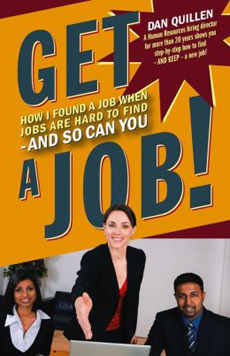
When Dan Quillen was laid off in 2011, he called on his H.R. background to help him land an interview for every four résumés he submitted — a response rate that was 19 percent higher than peers' in his networking groups.
How'd he do it? Hint: Social-media savvy played a big role in getting his résumé more visibility. Among the lessons in his book, Quillen details why using social media is an organic, far-reaching, and imperative strategy to nabbing the job you want.
Quillen's big tip: Social channels are a must for job searches (unless you have time to waste).
What that means: It can be embarrassing to admit you're job hunting — especially if it's the result of a layoff. But the sooner and faster you get the word out that your services are available for hire, the better.
Advice in action: Broadcast as widely as possible that you're looking for a new position. Use LinkedIn, Facebook, Twitter — any and all social networks that make sense for you — to cast your social-networking net wide, Quillen says.
Join groups, from college alumni to those of current or past employees at companies where you'd like to work — and participate actively. This provides an opportunity to expand your networking beyond those who are geographically close enough for you to meet with in person.
"You never know what corner of the social-networking universe may hide your dream job and who may spread the word about it," says Quillen.
And if a case of embarrassment strikes, recall: Most employees receive a referral bonus for bringing in solid candidates — and that'd be you.
This story was originally published on LearnVest. LearnVest is a program for your money. Read their stories and use their tools at LearnVest.com.
More from LearnVest...
-
 The ‘ravenous’ demand for Cornish minerals
The ‘ravenous’ demand for Cornish mineralsUnder the Radar Growing need for critical minerals to power tech has intensified ‘appetite’ for lithium, which could be a ‘huge boon’ for local economy
-
 Why are election experts taking Trump’s midterm threats seriously?
Why are election experts taking Trump’s midterm threats seriously?IN THE SPOTLIGHT As the president muses about polling place deployments and a centralized electoral system aimed at one-party control, lawmakers are taking this administration at its word
-
 ‘Restaurateurs have become millionaires’
‘Restaurateurs have become millionaires’Instant Opinion Opinion, comment and editorials of the day